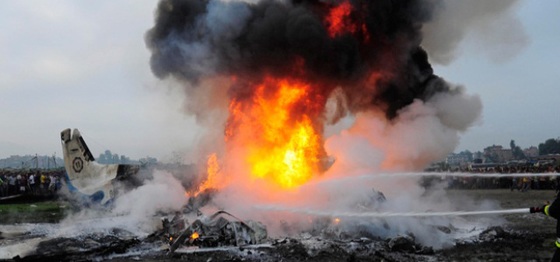|
Image may be NSFW. Clik here to view. 
|
| Maiduguri Airport in flames. Image from BizWatchNigeria. |
Boko Haram's latest attack in Maiduguri has been described as its most audacious yet. In the early hours of Monday morning hundreds of Boko Haram militants stormed the city of Maiduguri, the capital of Borno state, in an assault that left scores of people dead. The estimated number of fighters ranged from 300 to 500, and according to one Nigerian intelligence officer, they entered Maiduguri "from the bush, chanting 'Allahu Akbar.'" Once they arrived in the city, the fighters attacked the Maiduguri Airport, a Nigerian Air Force Base, and various locations around the base. The use of both explosives and RPGs has been confirmed.
The attack has caused a political storm in Nigeria. A new political coalition, now one of Nigeria's largest opposition parties, has called for a probe into intelligence failures before the attack, and questioned how several hundred militants could strike a military facility in a large city without prior warning. President Goodluck Jonathan is said to be furious over the incident, and there are allegations in the Nigerian press that "heads may roll" if assertions of sabotage and negligence of duty are proved true. With new accusations that the military's offensive against Boko Haram has been a failure, things are likely to get worse even while discussions take place as to how to make things better.
The government had recently extended emergency rule in Borno as well as in the nearby states of Adamawa and Yobe, in an effort to crush the Boko Haram insurgency. Despite the fact that there are over 8,000 troops now deployed in these states, they have obviously not been successful and the International Criminal Court has officially designated Nigeria as embroiled in a civil war. The situation was so bad last month that President Jonathan was asked to cancel the visit of Bill Gates for fear it may trigger Boko Haram attacks on polio workers.
The ability of Boko Haram fighters to escape into other countries has also greatly frustrated Nigeria. A Borno state official recently accused Cameroonian authorities of habitually refusing to arrest or chase Boko Haram militants fleeing across the border after carrying out attacks in Nigeria. Although a regional strategy would be ideal for Nigeria, Cameroon has shown little interest in the problem, while Niger and Chad do not have adequate resources to help. A member of Boko Haram captured by the military in Maiduguri claimed that the group has members from each of these countries actively taking part in the insurgency. Furthermore, United Nations officials have stated that they think Boko Haram is now active on the ground in Central African Republic.
But of more immediate concern for Nigerian officials is that Christmas is fast approaching - a period during which, since 2010, Boko Haram has been particularly active. On Christmas Eve of that year, Boko Haram targeted Christians in a campaign of improvised explosive device (IED) attacks that left 80 dead. On Christmas Day 2011, at least 37 people were killed during morning Mass at the Saint Theresa Catholic Church in Madalla near Abuja, and at least three died in four other bomb attacks that day. Last year, Boko Haram declared its intention to "eradicate Christians from certain parts of the country," and is believed to be behind two separate Christmas Eve attacks; one that killed at least six Christians and burned down a church Yobe, and another that killed six in Maiduguri.
If the recent attack in Maiduguri is any indication, Boko Haram has shifted its tactics and grown more sophisticated. The group is now prepared to directly attack military installations, and in large numbers. This is particularly striking since the attack took place just one week after the Nigerian military claimed it had cleared the terror group from bases in the Sambisa forest and that more than 100 Boko Haram fighters had been killed during the assault.
Additionally, there are now reports of both suspected insider collaboration and that the attack took place as Nigerian Special Forces were planning one of their biggest offensives against the group. According to one source, Boko Haram successfully planted IEDs before the attack, and the authorities strongly believe "that this incident was made possible by insiders' collaboration in terms of giving them information." This means that Boko Haram may well have a better intelligence network than the Nigerian military.
With Boko Haram escalating its activities, this year's Christmas season could be one of the most telling periods for a Nigerian government desperate to prove that it is capable of putting down the insurrection.